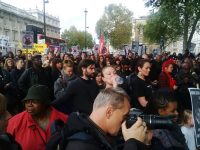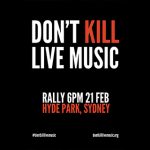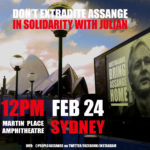NSW’s Anti-Protest Package: Unconstitutional?

Australian legal bodies and human rights advocates warn that New South Wales’ controversial new anti-protest laws pander to the mining industry, stripping citizens of their rights and granting police excessive powers.
The Inclosed Lands, Crimes and Law Enforcement Legislation Amendment (Interference) Bill 2016 was only recently put to the NSW Parliament by the Minister for Industry, Resources and Energy. It was passed both houses of NSW Parliament last week with the support of the Shooters and Fishers Party and Christian Democrat Fred Nile, despite reports that more than half of NSW residents oppose the move.
The Bill has triggered emotive debate and paved the way for legislation which creates a new offence of ‘aggravated unlawful entry on inclosed lands’ – extending the existing offence of intentionally or recklessly interfering with a mine, which carries a penalty of imprisonment for up to seven years, to include coal seam gas exploration and extraction sites.
Hugh de Kretser, the Executive Director at the Human Rights Law Centre notes that:
“At the same time as ratcheting up this penalty for individuals who protest, recent changes made by the NSW government mean that resource companies that illegally mine can receive a $5000 penalty notice instead of a potential $1.1 million fine.”
Jenny Leong, Member for Newtown said, “The expansion of these powers is unacceptable and a clear breach of our basic human rights. It is yet another attack on civil liberties—on groups, organisations and individuals who wish to speak out, act up and demonstrate resistance to this Government’s conservative agenda. If the neoliberals and big corporations have one thing in common, it is to come together to lobby governments for less regulation and more government policy that enables them to maximise profits.”
Submissions by the NSW Bar Association called for greater protection of basic civil liberties and the right to protest peacefully, warning the legislation has a broad reach which affects those wishing to protest peacefully, not just those involved in extreme cases of locking-on in protests at mine sites.
Australian Lawyers for Human Rights president, Nathan Kennedy, says he agrees with these concerns:
“I query whether this legislation is even constitutional. The legislation may well limit the ability of individuals to engage in legitimate political communication, which is one of the few human rights protected under the Australian Constitution,” Mr Kennedy said.
“ALHR considers this legislation to be inconsistent with Australia’s obligations under the International Covenant on Civil and Political Rights, which guarantees the right to freedom of expression and freedom of assembly. These rights are fundamental to a healthy democracy.”
Stephen Banks, President of the New South Wales Council for Civil Liberties, says the extra police powers provided by the new laws are simply unjustified.
“Police powers which are based on their assessment of a person’s intention are very easily able to be abused and undoubtedly will be abused in many cases—police shouldn’t have those kinds of powers,” he said.
These wide-reaching anti-protest laws, which provide police with even greater powers, add to a growing list of examples where Australian governments have unreasonably encroached on the basic rights and freedoms of citizens.
Mr Krester says: “We need to call out regression like the NSW anti-protest legislation for what it is. We need to recognise the cumulative democratic harm being inflicted by particular environment, counter-terrorism or refugee policies. Ultimately, if we truly care about protecting our democratic rights and freedoms, we need to guarantee them in an enforceable national Human Rights Charter.”






